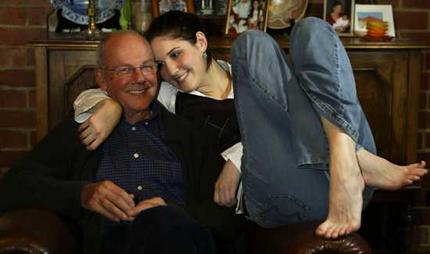
Daisy, with her dad Paul, says she is curious about her biological father
and is open to meeting him.
Photo: Michael Clayton-Jones
My dad is my dad, but who gave the sperm?
By Carol Nader
Health Correspondent

Daisy, with her dad Paul, says she is curious about her biological father
and is open to meeting him.
Photo: Michael Clayton-Jones
Daisy has known all her life that another man helped her parents have the child they always wanted. The man supplied the sperm but her real father, she says, is the man who has raised her for 17 years.
She adores her parents, Paul and Andrea, but when she turns 18, she would like - just out of curiosity - to meet the donor who helped give her life.
But she is prepared for disappointment if the donor does not want to meet her.
Under laws in place when Daisy was born, a donor must consent before any meeting. Donors lost their right to anonymity in 1998.
"I'm curious and I would like to know my history," Daisy says. "I don't need another father, I've already got one." Under the laws, a donor now can contact a child through health authorities when the child turns 18 - whether or not the child knows his or her biological origins.
But only 30 per cent of children know how they were conceived, and Daisy says all parents should tell their child.
"I think we have every right in the world to know how we're conceived and even though they are our parents they shouldn't keep it from their children because it's nothing to be ashamed of," she says.
"If my parents had never told me, it would ruin all that I'd been brought up on. I would be confused, I wouldn't know where I stood, I'd be a mess."
She says that for children to learn from authorities how they were conceived would be harsh - and a donor should only have the right to try to contact a child if the child is aware of its history.
Some donors have no desire to meet the children. Bruce has fathered three sets of twins and another child as a sperm donor - as well as two of his own children.
He was happy to supply the goods when the law allowed him to be anonymous. But once he lost any right to anonymity, he says, the sperm banks lost any right to his sperm. He is horrified that a person he helped conceive might knock on his door.
"We've got some needy couples out there who would love to have children and for whatever reason cannot," he says.
"We would love to make a gift to these people of this sperm and hopefully that will result in some happy healthy kids. My choice is I do not want to be contacted by the children."
Some people say there is a danger that some couples might try to escape the hysteria that such a complex and emotive issue may generate once their child turns 18, that they are having their children - conceived through donor sperm - on the sly. At least a handful of couples is believed to have escaped official scrutiny by failing to tell the clinic where insemination took place that they have conceived.
A researcher at the Key Centre for Women's Health in Society at Melbourne University, Maggie Kirkman, says she has heard of couples trying to "escape" monitoring by simply not telling the authorities.
"Some parents can't confront their own infertility and don't want anyone else to know about it because it's too crushing to have to use another man's sperm to have children," she says.
Monash IVF medical director Gab Kovacs says a loophole helped couples get around the system.
"They work out that if they don't tell us about the pregnancy they don't get on the register," he says. "They have control again. It's dishonest and unethical and illegal and I don't condone it, but I think that's what some people will do."
Melbourne IVF infertility counsellor Jenny Blood says couples could just "disappear".
Infertility Treatment Authority chief executive Louise Johnson says couples who breached the law could face penalties.
"Certainly when they undergo treatment with the clinics they sign forms that indicate that they will notify the clinic if there's a birth," she says.
A Government spokesman says: "It would obviously be very unfortunate if people were doing this because, illegality aside, they're not getting the kind of support and counselling that they need when they fall pregnant."